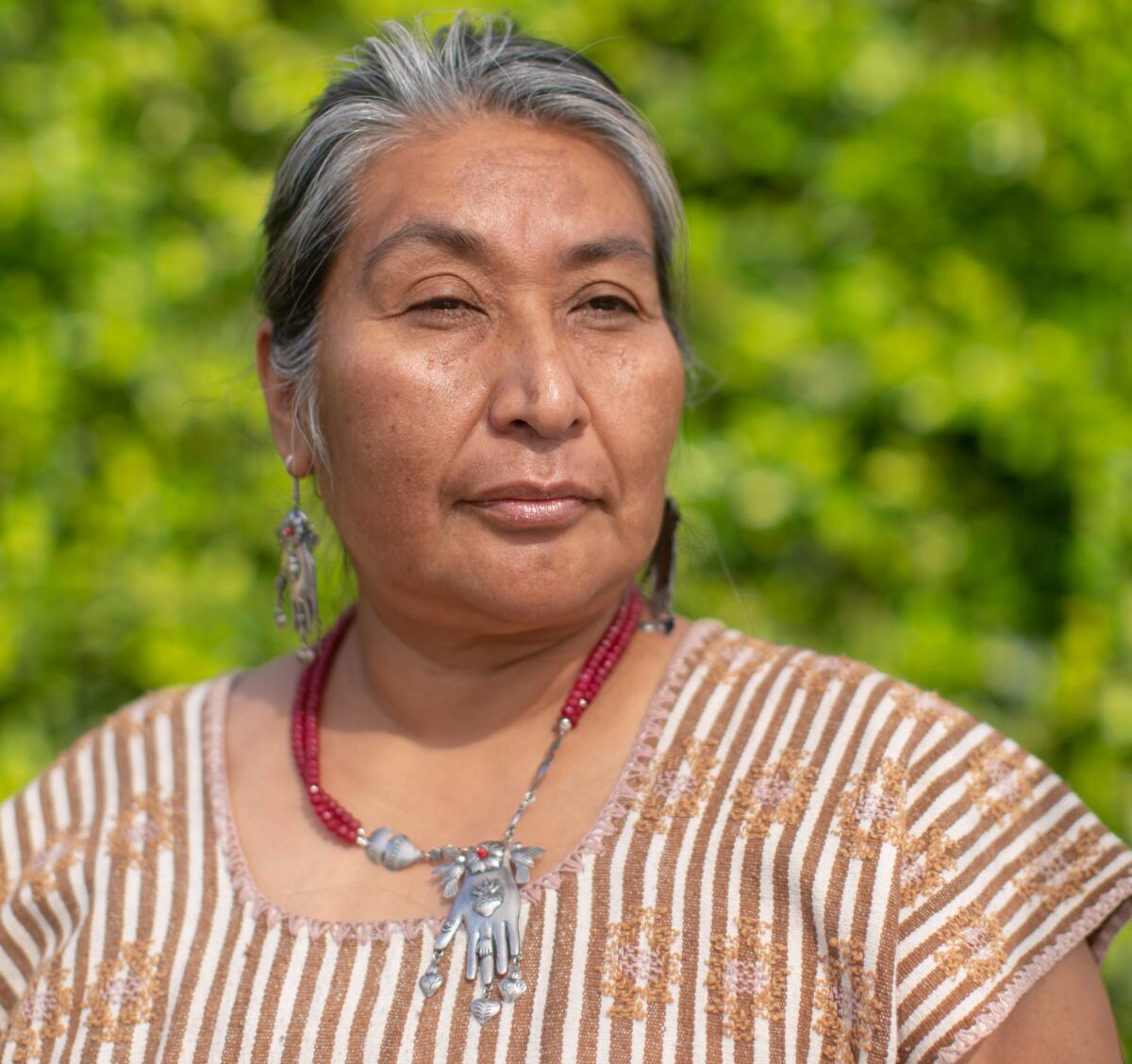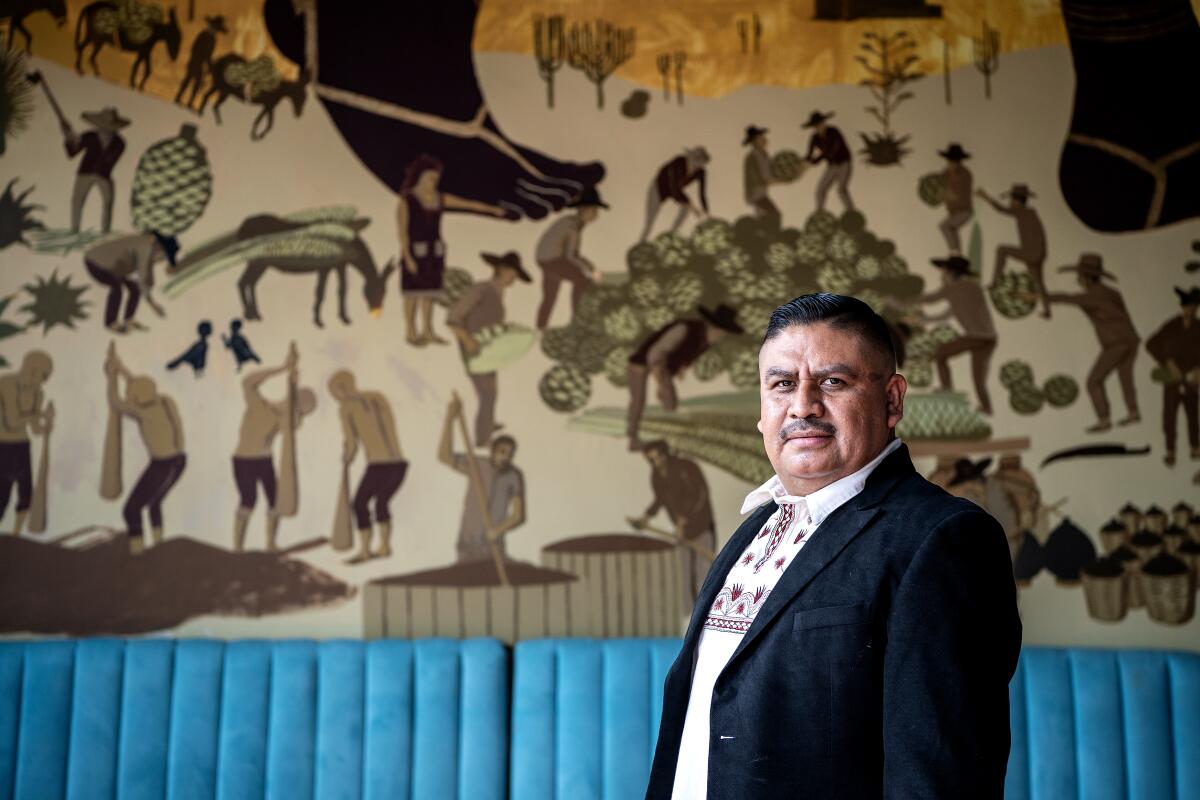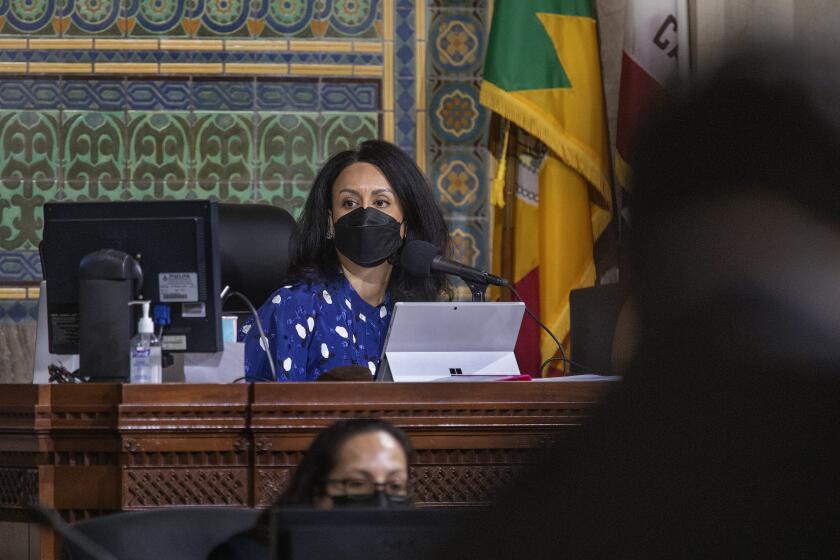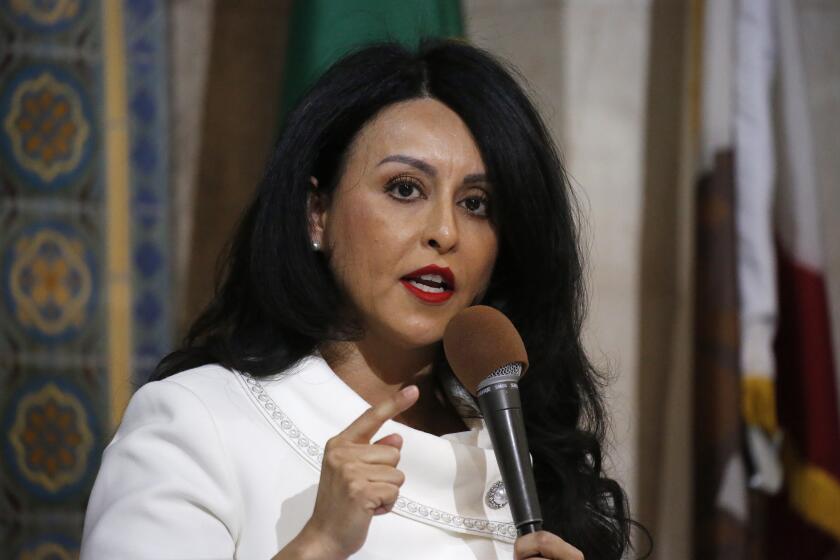For Oaxacans in L.A., City Council members’ racist remarks cut deep

Leaders in the Oaxacan community of Los Angeles backed the call for the resignation of City Councilmember Nury Martinez and two colleagues involved in the year-old recorded conversation in which she made racist remarks about Indigenous residents with roots in the southern Mexican state.
On the steps of City Hall on Monday — coincidentally on Indigenous People’s Day — Indigenous and Black leaders condemned the racist comments Martinez made during a recorded meeting with Councilmembers Kevin de León and Gil Cedillo and Los Angeles County Federation of Labor President Ron Herrera.
In the conversation last October, the councilmembers were discussing redistricting maps when they disparaged Black and Indigenous people in starkly racist terms.
All four have apologized for their comments. After Martinez resigned from her position as president of the City Council on Monday, many Oaxacans said it was not enough and continued to call for the resignation of Herrera and all three councilmembers from their seats, saying their comments were divisive and contributed to the prejudice Indigenous people face.
A leaked audio recording of members of the L.A. City Council, including Council President Nury Martinez has rocked L.A. politics months before a key election.
For Oaxacan leaders, the insults were painful but not surprising, reminiscent of the racism and colorism Indigenous people face in Latin America and the United States.
“It’s upsetting that they’re inciting hate against Black people, they’re inciting hate against Indigenous people and contributing to the violence” against these groups, said Odilia Romero, director and co-founder of Comunidades Indígenas en Liderazgo, or Indigenous Communities in Leadership. “It’s an everyday thing. I go through it every day as an Indigenous woman. My relatives go through it every single day, in different institutions in different places. But I do have to remind all of you and the politicians ... that we make this city.”
Los Angeles is home to one of the largest Oaxacan communities outside of Mexico. One expert estimated that there are as many as 200,000 Zapotecs — the largest Indigenous group from Oaxaca — living in Los Angeles County. As early as the 1940s, Oaxacan immigrants came to the U.S. in search of better wages and jobs, working in agriculture through an established bracero program of seasonal migrant workers. Oaxaca is one of Mexico’s poorest states, but the people have deeply influenced U.S. culture and food and shaped Los Angeles over the years.
The racist comments by Councilmember Nury Martinez in a leaked recording are only part of a chaotic political landscape in Los Angeles, where an election is just weeks away.
When elected officials mock Indigenous people, Romero said, it means they are being left behind by government policies and programs despite their economic contributions.
Indigenous Oaxacans expressed frustration and anger at Martinez’s comments referring to them as “little short dark people” — a racist stereotype often used to demean Indigenous communities.
“I was like, I don’t know where these people are from, I don’t know what village they came [from], how they got here,” Martinez said, before adding “Tan feos” — “They’re ugly.”
Ivan Vasquez, owner of Madre!, a Oaxacan restaurant and mezcaleria, questioned whether Martinez truly understood L.A. to make such callous remarks about one of the largest Indigenous communities in the city. His aunts migrated to Los Angeles in the 1990s and he arrived when he was 16. He noted that Oaxacans can be found at Michelin-rated restaurants working in the kitchen and shaping non-Mexican cuisine.

“I thought we had made great progress in the last three years in gaining recognition,” Vasquez said. “Many Oaxacans like me, we have businesses. We contribute to the city the same or more than other minorities and white people.”
The comments, he said, reflected a lack of knowledge about L.A. Indigenous culture.
“I’m brown, I’m short, but I’m here in L.A. L.A. belongs to us,” said Vasquez, who echoed the calls for resignations. “And we’re not going anywhere.”
Oaxacans in Mexico have long faced prejudice and struggle to be represented. After Yalitza Aparicio became the first Indigenous woman of Mexico to be nominated for an Oscar for best leading actress in the 2018 movie “Roma,” she faced a wave of vitriol from other Mexican celebrities and personalities. In a society that covets whiteness and Western features, Indigenous communities have long struggled for a more visible presence and accurate representation in government and media.
Miriham Antonio, 25, who grew up in Koreatown with her Oaxacan relatives, was outraged by Martinez’s rant.
“Those comments, they’re about my uncles and aunts and family friends,” Antonio said. “To me, it’s baffling that they’re representing L.A. and they don’t know anything about the Oaxacan community. We’re students, we’re law students, we’re here and we’re working hard. And for them to diminish our existence in such a belittling way is insulting.”
Audio of Councilmembers Nury Martinez, Kevin de León and Gil Cedillo speaking with labor leader Ron Herrera quickly became a new and incendiary issue in the Nov. 8 election.
Antonio said she phone banked for De León’s mayoral campaign and gifted him a traditional Oaxacan shirt in honor of her community.
“I thought he cared about our issues,” Antonio said, “but it’s infuriating to see that he was a part of this conversation and he didn’t step up to say anything.”
Bricia Lopez, co-owner of the restaurant Guelaguetza, said on Twitter that Martinez’s comments about Oaxacans in Los Angeles “cut deep” especially when coming from a fellow Latina.
“I’ve dealt with my fair share of racism. But it’s ten times worse when it comes from a brown and woman,” Lopez wrote. “Girl, you gotta resign.”
That sentiment was echoed by Sandra Lopez, who spent her day off at City Hall with her mother to rally support for the councilmembers to resign.
“I felt like I could identify with her,” Lopez said of Martinez. Instead, she said, “her true colors came out.”
More to Read
Sign up for Essential California
The most important California stories and recommendations in your inbox every morning.
You may occasionally receive promotional content from the Los Angeles Times.













